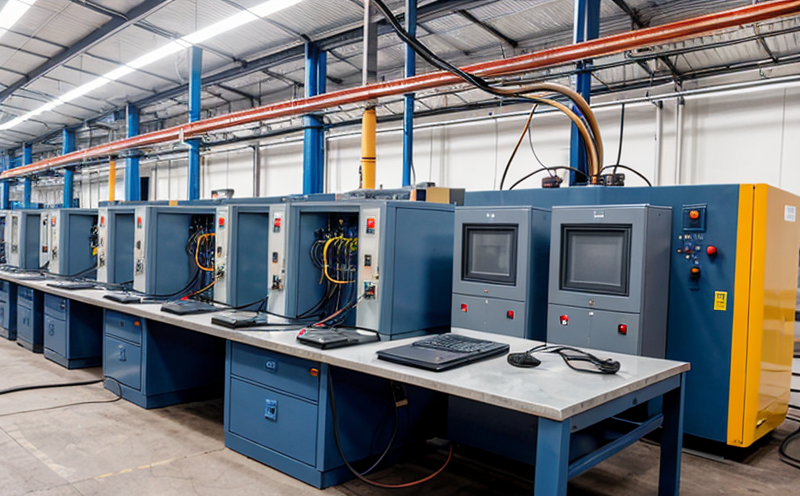ISO 22201 Lift and Elevator Control System Testing
The ISO 22201 standard provides a framework for ensuring that lift and elevator control systems are designed, manufactured, installed, and maintained in compliance with safety requirements. This service focuses on the rigorous testing of these critical components to guarantee they meet international standards.
Our team specializes in performing detailed functional tests, electrical checks, and performance verifications as per ISO 22201 guidelines. By conducting this testing, we ensure that lifts and elevators are not only safe but also reliable, efficient, and compliant with global safety regulations.
The testing process involves the following key steps:
- Inspection of all control systems for adherence to design specifications
- Functional tests on various operational scenarios such as start/stop, door operation, leveling mechanisms, and emergency stop functions
- Evaluation of electrical components including wires, connectors, relays, and circuit boards
- Performance checks under different environmental conditions to ensure robustness
- Data logging and analysis to provide comprehensive reports
The testing methodology aligns with international standards such as ISO 22201-1, which covers the design and manufacture of lift control systems. Compliance ensures that the lifts are safe for use in various environments including residential buildings, commercial complexes, and public transportation.
Our expertise in this area allows us to provide a thorough assessment of each component's performance under real-world conditions. This includes simulating emergency situations like power failures or mechanical malfunctions to ensure the system's reliability during critical scenarios.
Benefits
The implementation and testing of ISO 22201 standards offer numerous benefits, particularly for industrial manufacturing and processing facilities that rely on lifts and elevators. These include enhanced safety, increased efficiency, reduced maintenance costs, and compliance with international regulations.
Enhanced Safety:
- Reduces the risk of accidents by ensuring all systems function as intended
- Maintains regulatory compliance to avoid penalties or legal issues
- Provides peace of mind for facility operators and users
Increased Efficiency:
- Optimizes workflow within industrial facilities by ensuring smooth operation
- Minimizes downtime through thorough testing before deployment
- Improves overall productivity by addressing potential issues early on
Reduced Maintenance Costs:
- Avoids costly repairs or replacements due to undetected flaws during initial installation
- Eases the maintenance schedule by identifying areas requiring attention proactively
- Sustains long-term reliability of lift and elevator systems over their lifecycle
Compliance with International Regulations:
- Achieves global standards ensuring safe, efficient, and reliable lifts and elevators
- Facilitates international trade by meeting required safety and performance criteria
- Supports sustainable operations through the use of compliant equipment
Our services are tailored to meet the specific needs of our clients in industrial manufacturing environments. From small-scale installations to large complex systems, we provide comprehensive testing solutions that ensure compliance with ISO 22201 standards.
Industry Applications
| Application Area | Description | Testing Scope |
|---|---|---|
| Residential Buildings | Ensuring safe and efficient movement in multi-story dwellings. | Includes functional tests for door operation, leveling mechanisms, and emergency stop functions. |
| Commercial Complexes | Providing reliable transportation solutions in office and retail spaces. | Testing of electrical components such as wires, connectors, relays, and circuit boards under various conditions. |
| Parking Structures | Maintaining safe access to multi-level parking facilities. | Performance checks under different environmental conditions like temperature fluctuations or humidity levels. |
| Hospitals & Healthcare Facilities | Aiding in the rapid and safe transport of patients, medical equipment, and staff. | Data logging and analysis to ensure compliance with ISO 22201-1 standards for design and manufacture. |
| Public Transportation | Ensuring seamless passenger movement within public transit systems. | Evaluation of control systems under varying operational conditions including emergency scenarios. |
The aforementioned applications highlight the versatility and importance of ISO 22201 compliance in various sectors. Each application area requires specific attention to detail during testing to ensure that all lifts and elevators meet the necessary safety and performance criteria.
Competitive Advantage and Market Impact
Adopting ISO 22201 standards not only enhances safety but also positions companies at a significant competitive advantage within their markets. By ensuring compliance with these international standards, businesses can:
- Gain market access to countries that mandate such compliance
- Demonstrate commitment to quality and safety, thereby increasing customer trust
- Avoid costly recalls or product modifications due to non-compliance issues
- Increase operational efficiency by minimizing downtime associated with faulty systems
- Attract high-quality talent seeking employers that adhere to stringent standards
- Develop a reputation for reliability and innovation, enhancing brand value
The testing process we provide is not just about meeting basic requirements; it's about exceeding expectations. Our rigorous approach ensures that each lift or elevator control system is fit for purpose, thereby contributing significantly to the overall safety and efficiency of industrial operations.
By partnering with us, your organization can ensure that it meets all necessary standards, thus avoiding potential risks associated with non-compliance. This proactive stance sets you apart in a competitive market where quality and reliability are paramount.





